The positive impact of commuting by bicycle
 Sat, August 27, 2011
Sat, August 27, 2011 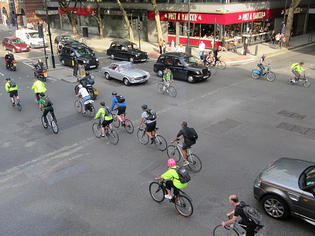 The London School of Economics recently published a report on the economic impact cycling has in Britain.
The London School of Economics recently published a report on the economic impact cycling has in Britain.
The report states that in 2010 cycling contributed 2.9 billion British Pounds to the economy.
Which would be 4.7 billion US Dollars; note that is billion with a “B.”
This figure is not just new bicycle sales; it includes income made by people working in bicycle manufacturing and retail. It also estimates for example that people who commute to work by bike are healthier and therefore take less sick days off work. There are many other factors taken into account that contribute to the 2.9 billion figure; you can read the full report here.
One piece of information I gleaned from this report (On page 16.) is that between 10,000 and 15,000 people commute into London every day by bicycle. That figure is up 52% since 2007, and the forecast is for that number to quadruple by 2025.
I wonder if the average motorist driving into London and complains about the increased number of cyclist he encounters, realizes what a huge positive impact that number of regular bicycle commuters has on his daily drive.
As most people drive solo in a car, 10,000 bikes means 10,000 less cars on the road on any given day; 10,000 bike commuters is the low side of the estimate.
A car needs a lot of space to operate, not just due to its increased physical size but due to the space required between each car which is far greater than the vehicle itself. Most car safety advocates agree that a car needs 2 seconds time lapse between vehicles in order to maintain a safe stopping distance.
At 20 mph. (29.33 feet per second.) a car should have 29.33 x 2 = 58.66 feet of space between it and the car in front. Add to that the length of the vehicle; let’s assume it is an average compact at about 15 feet.
That is 73.66 feet (22.45 meters.) of road space needed for every car; so take 10,000 cars off the road and you free up a whopping 139.5 miles of roadway. (Using Wolfram Alpha to calculate.)
The reason I chose 20 mph as the car's speed was because I figured this might be the average speed of a commute into to London during rush hour with the resulting stop and go traffic. A car would take up less space while at a standstill but would require more than 73.66 feet if going at more than 20 mph.
On the other hand, a bicycle takes up little or no space because the average car can pass a cyclist within the same lane. If a motorist has to slow to safely pass a cyclist, rather than become annoyed at the cyclist’s presence, he should realize that the cyclist represents one less car ahead of him that he would most likely not be able to pass.
Think of the impact that 10,000 per day less cars on the road has on the wear and tear of the road’s surface; a bicycle puts little or no wear on the road. Motorists who complain about the increased number of cyclists on the road, and complain about the cost of installing bike lanes, etc., are really not looking at the whole picture.
They should instead thank the person who decides to ride his/her bike to work, and in doing so takes one more car off the road. London is only one city in the world where this is happing.
I have recently been critical of cyclists in New York for running red lights, etc. However, bicyle commuting into New York City every day, will be having a similar positive impact as London, with the resuliting reductiion of cars.
Footnote: The picture of a London street at the top of this piece came from this article. (Worth a read.) It is interesting to note there are twice the number of bicycles in the picture than cars.
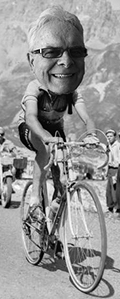









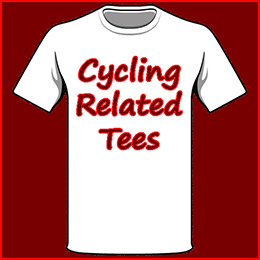











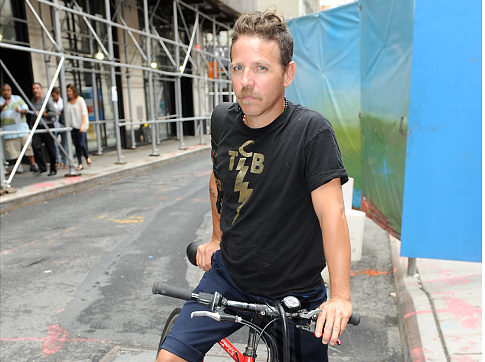

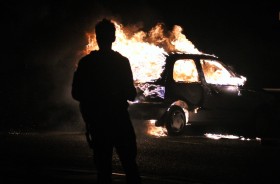
Just another distracted driving accident
A crumpled bike lies at the roadside along with a couple of other pieces of trash blowing by in the wind. The large dent in the front of the van and the broken windshield shows how hard the cyclist was struck.
The driver of this AT&T work van that struck and killed a cyclist on the Charleston James Island Connector Road in early July paid a $113 traffic ticket yesterday. In doing so he did not admit guilt and he does not even have to appear in court; the case is over. What kind of bullshit justice is that?
What has happened to our local Charleston Police Department’s pledge to serve and protect? There is very little serving or protecting going on as far as I can see.
This is not the first injustice; just last year two motorcyclists were stopped at a red light when an SUV rear ended them, killing them both. The two were from the same family, a man and his father-in-law. No charges were filed in that case; local motorcyclists were puzzled and outraged at the time, with good reason.
Both these are clear cases of distracted driving. Gregory Rupley the AT&T driver was charged with improper lane usage; police stated this was the closest applicable charge under state law involving a cyclist verses car accident.
The cyclist Mitchell Hollon, a much loved local anesthesiologist, was riding his bike on a wide and ample shoulder when he was struck from behind and was knocked over the side of a bridge to land in a marsh some 50 feet below.
Deemed an “Accident,” this happened on a straight stretch of highway so how could the driver fail to see the cyclist ahead of him? He was obviously distracted and not looking where he was going.
There were independent witnesses; where was the problem with bringing forth more serious charges and making them stick? Police it seems cannot be bothered.
There will likely be a civil case and the family of the deceased will no doubt receive a large settlement; however, this will not come out of driver Rupley’s pocket, but his employer AT&T and their insurance company.
Distracted driving is a huge problem and back when this incident happened I asked that people be held accountable for their actions. Treating the death of someone along the same lines as a parking ticket will not bring about accountability.
Mitchell Hollen, a fine outstanding citizen and member of our community is dead. His death was easily avoidable; if only the AT&T driver had paid better attention to his driving.